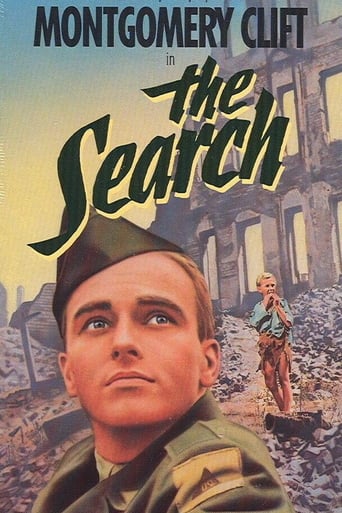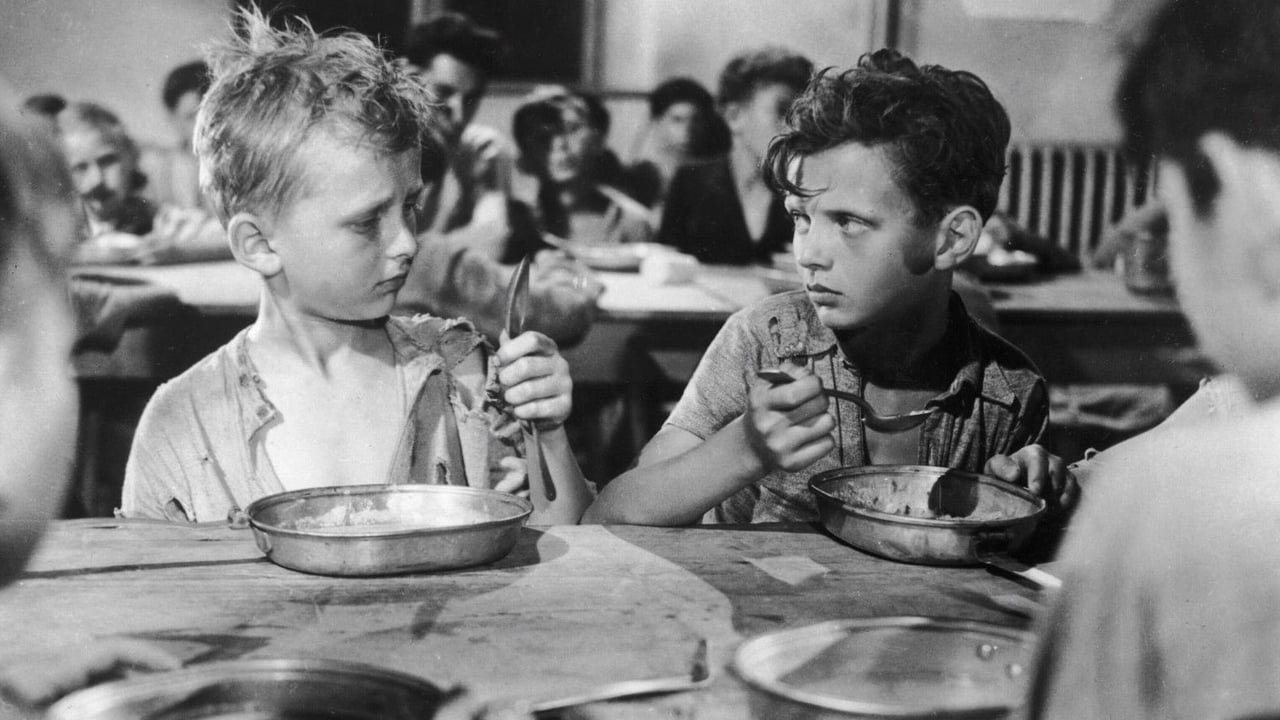JohnHowardReid
Producer: Lazar Wechsler. Copyright 31 March 1948 by Loew's International Corp. Preliminary copyright applied for by Loew's, Inc. A production of Praesens-Film, Zurich, for Metro-Goldwyn-Mayer. New York opening at the Victoria: 23 March 1948. U.S. release: 6 August 1948. U.K. release: 1 May 1950. Australian release: 17 March 1949. 9,450 feet. 105 minutes. NOTES: Partly photographed in the U.S. Occupied Zone of Germany, through the courtesy of the U.S. Army and the I.R.O
Only film of child actor Ivan Jandl, who received a special Hollywood award for "the outstanding juvenile performance of 1948".
Number 3 on the National Board of Review's list of the Ten Best Films of 1948.
Bosley Crowther of The New York Times also selected The Search as one of his Ten Best Films of the year.
The movie took excellent money on domestic release, but failed to ignite the British box-office. In the rest of Europe, however, The Search chalked up such huge receipts, it topped the list of M-G-M's most commercially successful releases of the year.
Australia followed the British pattern. Despite super-enthusiastic reviews, the movie took only fair money in the cultural centers of Sydney and Melbourne, with absolutely dismal takings elsewhere - even in Brisbane, the so-called "home of M-G-M". COMMENT: This film, made in its entirety in Europe in 1947, presents a number of parallels with another Zinnemann film, The Men (1950): both deal with the after-effects of war; both are virtually documentaries, with fictional elements added; and both use professional and non-professional actors very effectively.
The Search tells the story of a little boy, Karel Malik, who has been separated from his family in a concentration camp. Now that the war is over, the United Nations is trying to restore these thousands of displaced children to their parents. But Karel's experiences have left such a mark on him that he has forgotten everything about his earlier life, including his name and nationality. The UNO authorities decide to transfer him to a welfare camp, but en route Karel escapes and wanders around the rubble of Berlin. At the same time, Mrs Malik is going from one bureau to another seeking information on Karel, the only member of the family who may still be alive. Despite discouragements and failures, she finally arrives at the camp from which Karel has escaped. The film was shot on location among the ruins and rubble of Germany, and in the offices and depots of UNO. The actual direction, however, is characterized by Zinnemann's attractive sensibility, his quick feeling for moods and situations and unobtrusive use of natural backgrounds. The first reel is somewhat marred by a sentimental commentary, which Zinnemann says was included at the insistence of the producers; he wanted to remove it, but was unable to do so. As a whole, the film brings home very forcefully the full horror of war; but there are two individual scenes which stay long in the mind. The first is the sequence in which the children are being given their preliminary interviews: children of 7-10, in all the languages of Europe, tell unemotionally of gas ovens and tortures. The second occurs when the children are ready to be taken to UN welfare camps. They are about to be put into trucks bearing Red Cross symbols; they refuse to enter, remembering that the Nazis took people to gas chambers in such vans. When they are at last persuaded to enter and the trucks move off, stray fumes from the exhaust penetrate the back compartment, and the children panic. Nothing is seen but their faces full of fear, and their hands clawing to break down the doors. These two scenes render the atmosphere of war-time Europe in a way that a thousand books and lectures could never do.
The professional actors underplay with quiet assurance, and help invest the film with its air of actuality. Aline MacMahon is admirable as the harassed UN welfare officer, humane and realistic, trying to cope with the task of mending broken lives; Montgomery Clift, in his first screen appearance, acts with likeable charm; and young Ivan Jandl (as Karel Malik), despite the fact that his voice is dubbed by an English-speaking child, plays naturally and unaffectedly.
The material of The Search is grim, yet it assiduously avoids moralizing of the Divided Heart school. There are no messages, no hopeful prophecies for the future, simply a straightforward reportage on the European tragedy. For this movie, Zinnemann won the first Screen Directors Guild Award.
avik-basu1889
'The Search' is about the devastating consequences of WWII. What makes it heartbreaking is the fact that the film focuses on the effects the war had on children. The film follows Karel Malik, a boy who was separated from his family during the war. Along with other similar kids, Karel is rescued by the UNRRA officials in Berlin, but due to a misunderstanding, he runs away and on a chance encounter meets Steve, an American soldier.Is the film a bit predictable? Yes. Is the film a bit simplistic? Yes. Can I nitpick about a lot of things like the unnecessary voice- over at the beginning or the lack of depth to certain characters or even the slightly contrived plotting to arrive at the ending scene? Yes. However it is such a sweet, feel-good and affectionately made film that it won me over. Fred Zinnemann and the screenwriters were clearly trying to make a feel good film after the trauma of war and wanted to instill a sense of optimism for the future in the minds of the viewers.Like most Hollywood films of this era, Zinnemann isn't doing anything too bold or flashy with the camera, but even then the camera movements are swift and he succeeds in creating a powerfully bleak scenario in the first few scenes. The shots of the young, dirty, haggard and rickety kids running helplessly in the streets with the desolate and ruinous post war Berlin in the background were chilling. These scenes reminded me a lot of Italian neo-realism, specially Rossellini's War Trilogy. One can easily view the story as an allegory for the war itself with Karel representing young Europe. Karel's young life falls apart and he completely loses his spirit. But with the help of the American soldier(Steve), he gets back to his feet and ends up with a chance of having a fulfilling and optimistic future. The allegorical subtext of helpless Europe requiring America's help to survive and have a realistic chance at a good future after the war is undeniably present.The acting is good. The characters as a whole don't have too much depth, but they are all likable and they all embody the humanistic spirit of the film as a whole.'The Search' is not really a film I'll call great. It has its problems that I mentioned previously in the review and it doesn't really engage in too much narrative or character related depth. But it manages to create a humanistic, optimistic and feel-good vibe that I as a viewer couldn't escape. If a film manages to derive something hopeful out of something as hopeless as a war, it has to be admired and appreciated.
PamelaShort
The Search is an extremely absorbing, satisfying and most heart-rending drama of the highest sort. A film where many of the scenes were shot amidst the actual ruins of the post-war Germany cities, Nuremburg, Ingolstadt, and Wurzburg. The story concentrates on a young orphan boy who is a survivor of the Auschwitz concentration camp. He is befriended by a young, earnest G.I. who takes a sincere interest in the wide-eyed child, soon teaching him to speak fluent English. He decides to search aimlessly for any surviving relatives of the boy, for soon he must return to America with the homeless child. Meanwhile, the boys mother is not only alive, but has been searching desperately for her only child. With the two separately searching for each other, the viewer soon realizes a very heart tugging reunion is about to take place. Even though this happy ending is predictable, nothing can prepare you for the overpowering impact of emotion. Rarely does a movie pull you completely into such an staggering emotional state, all due to a poignant story, delivered by the superb performances of Ivan Jandl, Montgomery Clift, and Jarmila Novotna. Top-notch performances are given by all supporting actors in this perfectly paced film. A must see story for many reasons, especially for understanding the pitiful realities of war and the impact on innocent surviving victims.
krishkmenon
I saw this film in the early 1980's when as an Indian student in NY a senior friend who was a specialist on the movies made in the Hollywood Golden era introduced me to them. As a avid reader and history buff of the Second World war the film remains to date as one of my most favourite as I think that it is one of the few that really addressed the situation of the children refugees of the war. The story line is more or less accurate to a point as it is similar to whatever I have read on the period based on fact. The boy played by Ivan Jandl was as in the movie Czech and I am given to understand that he was later on persecuted by the Communist regime of Czechoslovakia for being US friendly. It is also a fact that though he was awarded a special Oscar he could not receive it. For a child of 10 his acting without mouthing any script is amazingly superb, maybe due to the fact that he had lived out such instances. Montgomery Clift - one of my personal favourites does not seem to act but live his role with ease. Aline MacMahon also does justice to her role and Jarmila as the mother is also excellent. However if it was not for the masterful direction of Fred Zinneman and the actual locations filmed in the bombed out post war Germany amidst the destruction and ruins maybe the film may not have been so good. Some of the scenes are etched in your memory eg. 1/ The wistful and longing look of the boy whilst at dinner sees another boy being fondled by his mother. 2/ When initially the children are being interrogated by the the Refugee Centre head a french boy recounts the horror of his being orphaned in Matheusen camp and another girl recalls collecting her mothers blouse after she perished in the gas chamber. These scenes can never be blotted out from memory. Don't miss a chance to view this classic.


 AD
AD



